Best Food Supplements for Vegans This Year
Table of Contents
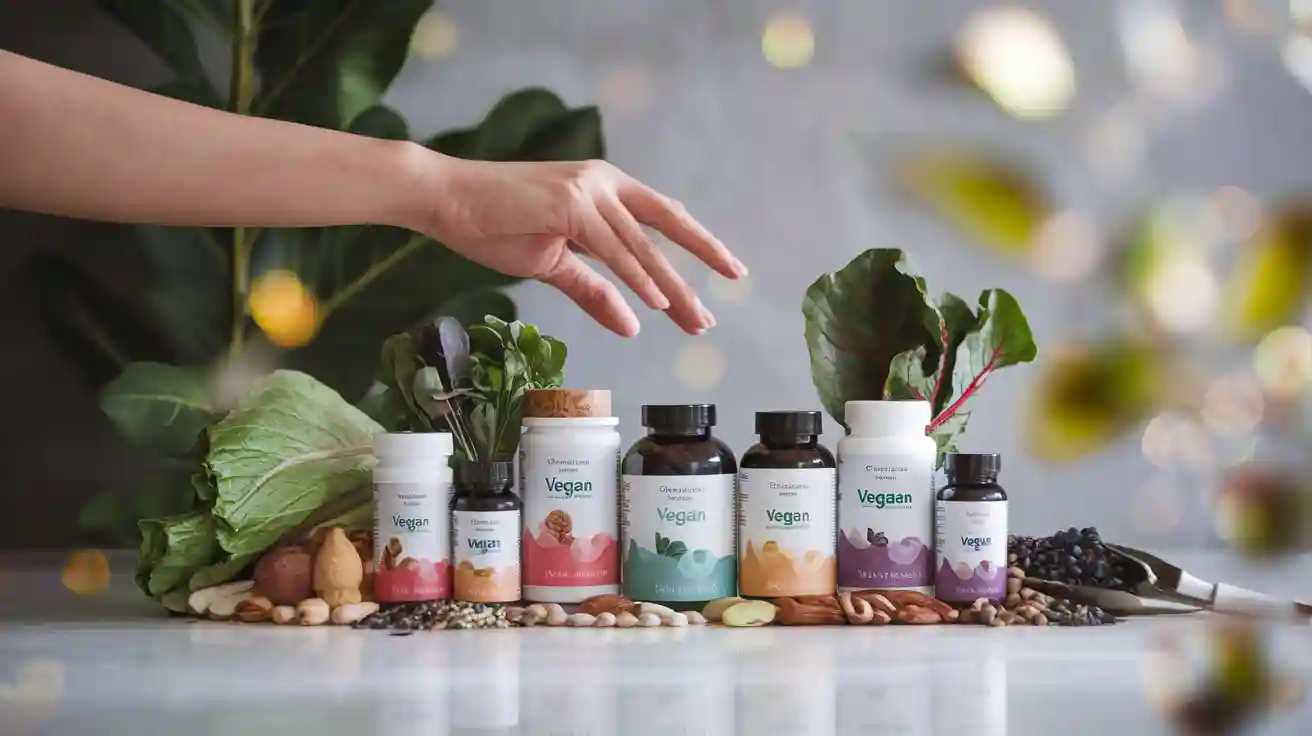
If you follow a vegan diet, you need to pay close attention to your nutritional needs. The most important food supplements for vegans in 2024 include vitamin B12, vitamin D, calcium, iodine, iron, zinc, selenium, and omega-3. Here’s a quick look at what matters most for your plant-based diet and healthy vegan nutrition:
| Supplement | Importance |
|---|---|
| Vitamin B12 | Most consistently recommended; essential for preventing deficiencies and maintaining health. |
| Vitamin D | Important for bone health; reduces risk of fractures when supplemented with calcium. |
| Calcium | Works with vitamin D for bone protection; crucial for vegans to prevent deficiencies. |
| Iodine | Often low in vegan diets; supplementation may be necessary to prevent deficiency. |
| Iron | Can be low; supplementation should be based on individual dietary intake. |
| Zinc | Important for immune function; may require supplementation based on diet. |
| Selenium | Often low in vegan diets; supplementation may be necessary. |
| Omega-3 fatty acids | Important for neurological health; some vegans use algae-based supplements to meet needs. |
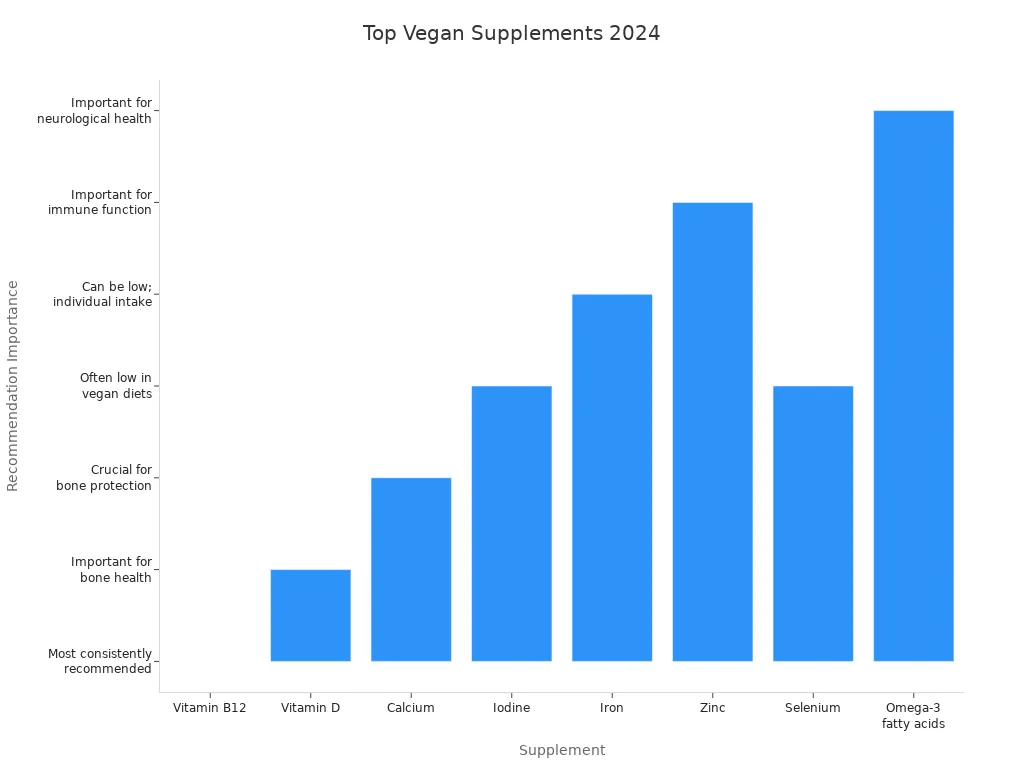
You might wonder if your plant-based diet covers all your nutrient requirements. Studies show that many vegans have low intake of key nutrients:
- 46% of people get less vitamin D than needed.
- 57% fall short on selenium.
- 63% of vegans don’t get enough iodine.
You can assess your nutritional needs by checking your diet and talking with a professional. Fortified foods and vegan-friendly source supplements help you maintain balanced vegan diet and support your health.
Essential Food Supplements
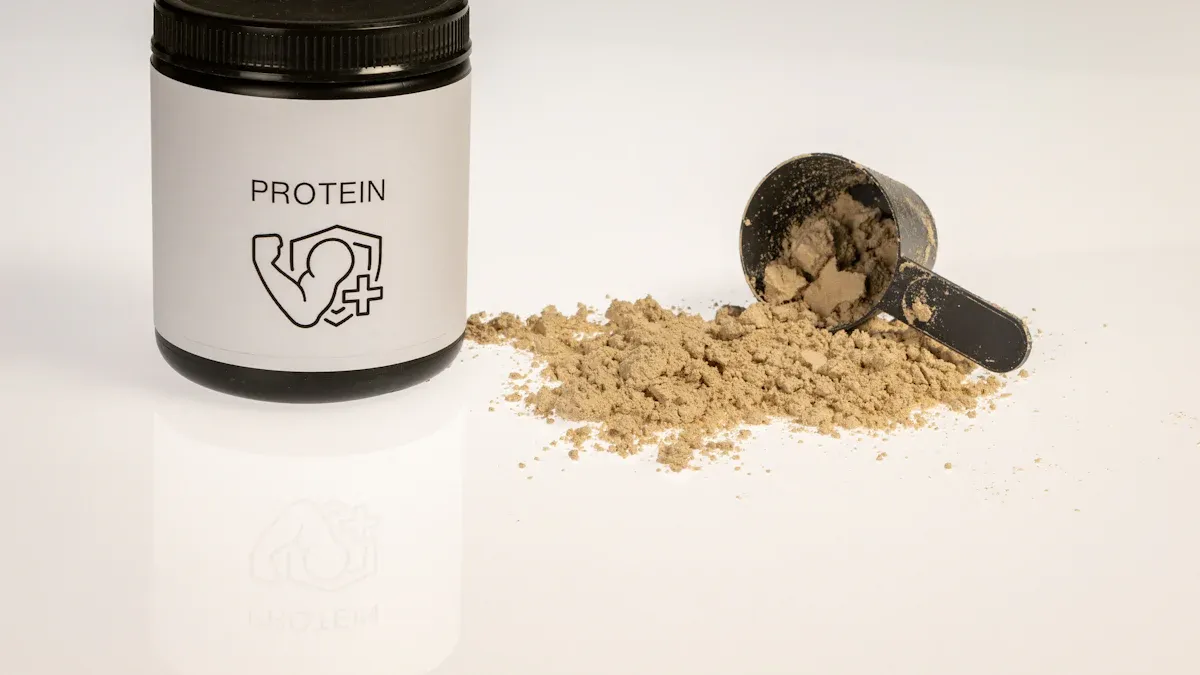
Quick List
You might wonder which food supplements matter most for a balanced vegan diet. Here’s a quick list of the top essentials that registered dietitians recommend for anyone following a plant-based lifestyle:
- Vitamin B12
- Vegan Vitamin D
- Vegan Iodine
- Vegan Omega-3
- Iron
- Calcium
- Folate
- Zinc
- Choline
- Selenium
These food supplements help you meet your nutrient requirements and support your health on a plant-based diet.
Why Supplementation Matters
You want to feel your best and keep your nutrition on track. Some essential nutrients are hard to get from plant foods alone. For example, vitamin B12 is crucial for red blood cell development and a healthy nervous system. If you do not get enough, you could face problems with your nerves or even your blood. Many vegans do not get enough vitamin D, calcium, or selenium. These nutrients keep your bones strong and protect your cells from damage.
Did you know? Low vitamin B12 intake can cause neurologic and blood problems. You should check your levels and use vegan supplements or fortified foods if needed.
Zinc, iron, and iodine also play big roles in your health. Zinc helps your immune system. Iron keeps your energy up. Iodine supports your thyroid. If you miss out on these, you might feel tired or get sick more often.
Plant-based diets offer many benefits, but you need to pay attention to these nutrients. Supplementation fills the gaps and helps you stay healthy. You can enjoy your plant-based meals and still meet all your nutrient requirements with the right food supplements.
Vegan Diet Nutritional Gaps
Common Deficiencies
When you follow a vegan diet, you might think you get everything you need from plant foods. But some nutrients are harder to find in a vegan meal plan. Here are the most common gaps you should watch out for:
- Vitamin B12
- Iron
- Calcium
- Vitamin D
- Iodine
- Zinc
- Omega-3 fatty acids
These nutrients play big roles in your body. You need vitamin B12 for your nerves and blood. Iron keeps your energy up. Calcium and vitamin D help your bones stay strong. Iodine supports your thyroid. Zinc helps your immune system. Omega-3 supports your brain and heart.
Let’s look at a quick table to see which nutrients are often low and what experts suggest for supplements:
| Nutrient | Common Deficiency | Recommended Supplementation |
|---|---|---|
| Vitamin B12 | Yes | 50–100 μg daily or 2000 μg weekly |
| Iodine | Yes | 150 μg daily for adults |
| Selenium | Yes | Only if you have a clinical deficiency |
| Vitamin D | Yes | 4000 IU daily |
| Calcium | Yes | Important for bone health |
| Iron | Yes | Crucial for blood health |
Risks of Low Intake
If you miss out on these key nutrients, your health can suffer. You might feel tired or weak. Some people get anemia when they do not get enough iron or vitamin B12. Weak bones can happen if you do not get enough calcium or vitamin D. Your brain and nerves need vitamin B12 and omega-3. Without enough, you could have trouble thinking clearly or feel numbness.
Tip: If you notice you feel tired a lot or get sick often, check your nutrition. Sometimes, a simple supplement can make a big difference.
Long-term gaps in your diet can lead to bigger problems. Anemia, osteoporosis, and even nerve damage can happen if you do not pay attention to these nutrients. You can protect your health by learning about your needs and choosing the right foods and supplements.
Vitamin B12 for Vegans
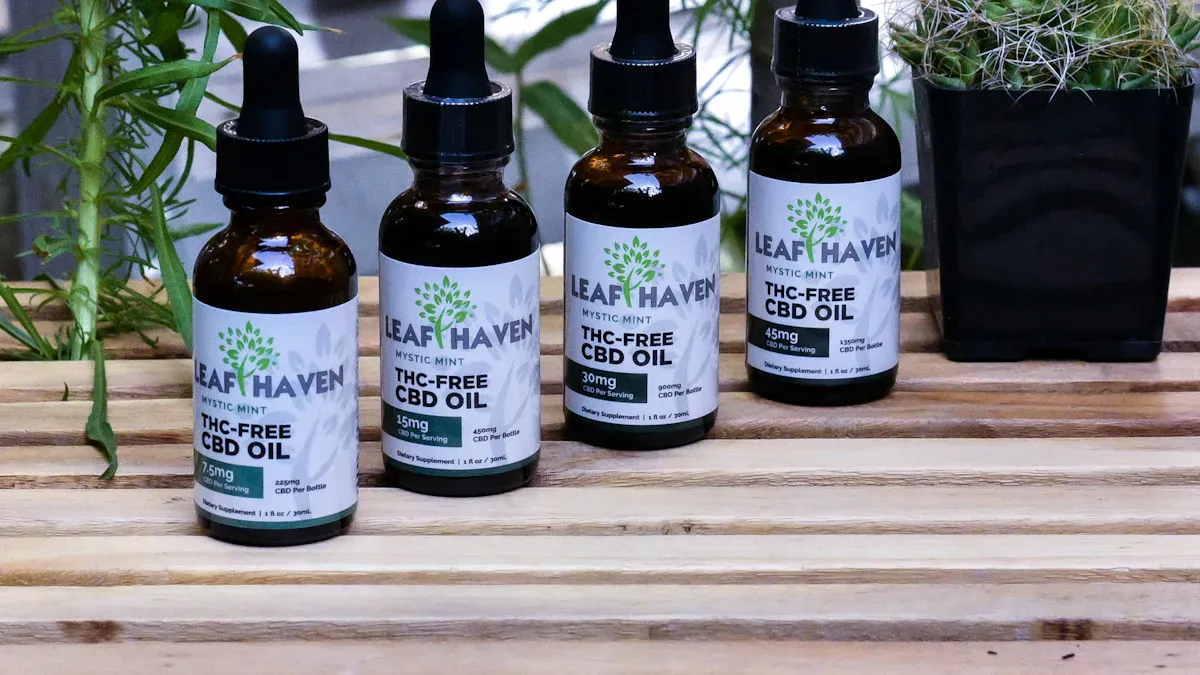
Importance
You need vitamin b12 to keep your body working well. This nutrient helps your nerves and blood stay healthy. If you follow a vegan diet, you face a higher risk of b12 deficiency because plant foods do not give you enough. Many studies show that people who do not use b12 supplements often have low levels. Take a look at this table to see what experts have found:
| Study Title | Findings |
|---|---|
| Exploring Vitamin B12 Supplementation in the Vegan Population: A Scoping Review of the Evidence | Vitamin B12 deficiency is prevalent among vegans due to limited consumption of animal products. Supplementation is advised to prevent deficiency. |
| The importance of vitamin B12 for individuals choosing plant-based diets | Vegans not taking supplements are at significant risk of deficiency; plant-based foods often lack reliable B12 sources. |
| Vitamin B12: Strategies for enhanced production, fortified functional food products and health benefits | Deficiency is more prevalent in vegans, highlighting the challenge of maintaining adequate levels. |
| Vitamin B12 supplementation and health behavior of Austrian vegans: a cross-sectional online survey | 92% of vegans take supplements, but intake should be improved. |
Not getting enough b12 can make you feel tired, weak, or even cause nerve problems. You want to protect your health, so paying attention to this nutrient is key.
Intake Recommendations
You might wonder how much b12 you need each day. Experts suggest different amounts, but here are some common recommendations:
- The Institute of Medicine says adults need 2.4 micrograms daily.
- The European Food Safety Authority recommends 4 micrograms per day.
- Many nutrition groups suggest you take a daily supplement of 50–100 micrograms, or a weekly dose of 2000 micrograms.
- Some vegan supplements offer 250 micrograms per day, which covers your needs.
Your body absorbs b12 better in small, frequent doses. If you rely on fortified foods, you may need to eat them two or three times a day.
Vegan Sources
You cannot get enough vitamin b12 from plant foods alone. The best way to meet your needs is to:
- Eat fortified foods two or three times a day to get at least three micrograms daily.
- Take a daily supplement with at least 10 micrograms.
- Or, use a weekly supplement with at least 2000 micrograms.
Fortified foods include some plant milks, breakfast cereals, and nutritional yeast. Always check the label to make sure they contain b12.
Supplement Choices
You have many options for b12 supplements. You can choose capsules, chewables, gummies, liquid drops, or sublingual tablets. The most common forms are cyanocobalamin and methylcobalamin. Cyanocobalamin is stable and cost-effective, while methylcobalamin is an active form. Both work well, so you can pick what fits your routine. There is no big difference in how your body absorbs these forms. Just make sure the supplement is labeled as vegan.
Tip: Add b12 to your daily routine along with other nutrients like omega-3 for complete nutrition.
Vitamin D in Vegan Diet
Role
You need vitamin d for strong bones and a healthy body. This nutrient helps your body absorb calcium and phosphorus. Without enough vitamin d, your bones can become weak and brittle. You also need vitamin d for muscle function and a strong immune system. If you do not get enough, you might face more infections or autoimmune problems. Here are some ways vitamin d supports your health:
- Helps your body use calcium and phosphorus for bone strength.
- Keeps your muscles working well.
- Supports your immune system and helps fight off sickness.
- Prevents weak bones and keeps you active.
Tip: If you want to keep your bones and muscles strong, make sure you get enough vitamin d every day.
Intake
You might wonder how much vitamin d you need. The amount depends on your age and life stage. Health experts give clear guidelines for daily intake. Check out this table to see what is right for you:
| Age Group | Recommended Daily Intake (IU) | Upper Limit (IU) |
|---|---|---|
| 0–6 months | 400 | 1,000 |
| 7–12 months | 400 | 1,500 |
| 1–3 years | 600 | 2,500 |
| 4–8 years | 600 | 3,000 |
| 9–70 years | 600 | 4,000 |
| Over 70 years | 800 | 4,000 |
| Pregnancy and Breastfeeding (over 14 years) | 600 | 4,000 |
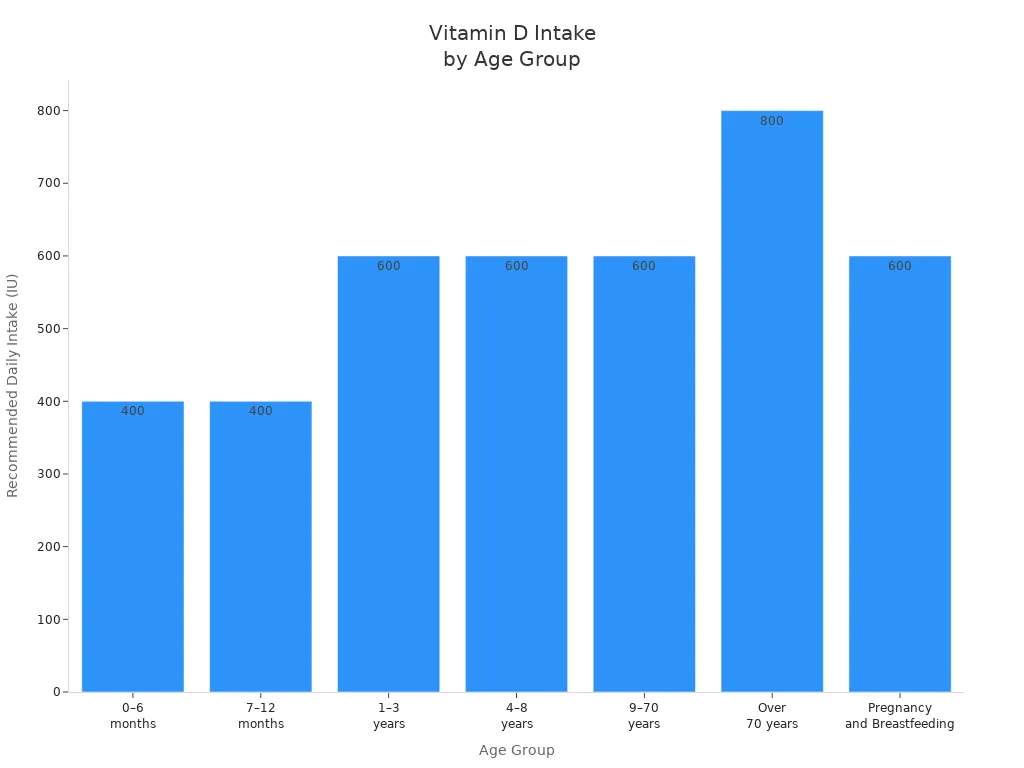
Most people need at least 600 IU of vitamin d each day. If you are older, you may need more. Always check your intake to make sure you meet your needs.
Sources
Getting vitamin d from food can be tough on a vegan diet. Plant foods do not have much vitamin d. You can find some vegan-friendly sources that help you meet your daily needs:
- Ora Sol Food High Potency Vitamin D3 + K2: 5,000 IUs per serving, made from organic plant ingredients.
- Future Kind: Capsules with 2,500 IU, eco-friendly and free from animal products.
- Chewwies: Sugar-free vegan d3 vitamins, 400 IU per serving, good for kids and adults.
- Global Healing: Plant-based vitamin d3 from lichen, supports immune health and bones.
You can also get vitamin d from sunlight, but that is not always enough, especially in winter or if you stay indoors.
Supplement Options
You have many choices for vegan supplements with vitamin d. These options come in sprays, capsules, pills, and liquids. Here is a quick look at some popular vegan vitamin d supplements:
| Supplement Name | Form | Dosage (mcg/IU) |
|---|---|---|
| Viridian vegan vitamin D3 | Spray/Drops/Capsules | Various options |
| Vegetology vegan vitamin D3 | Pill/Spray | 25 mcg (1,000 IU) or 62.5 mcg (2,500 IU) |
| Nordic naturals plant-based vitamin D3 | Liquid | 25 mcg (1,000 IU) per 0.5ml |
| Future Kind+ vegan vitamin D3 | Capsules | 62.5 mcg (2,500 IU) per pill |
| Together health vitamin D3 | Capsules | 25 mcg (1,000 IU) per pill |
| Mary Ruth’s vegan vitamin D3 liquid spray | Spray | 10 mcg (400 IU) per 4 sprays |
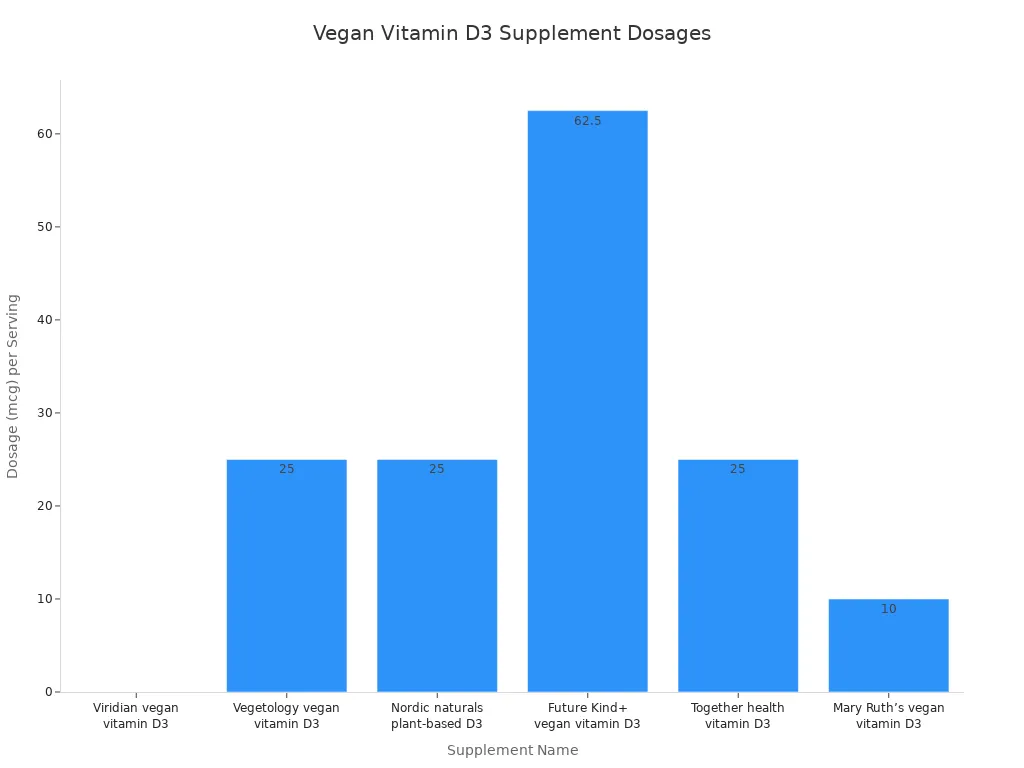
You can pick the form and dosage that fits your routine. Supplementation helps you fill gaps in your nutrition and keeps your vitamin d levels healthy. If you want to support your bones, muscles, and immune system, add a vegan vitamin d supplement to your diet. Many people also pair vitamin d with omega-3 for complete plant-based nutrition.
Iron in Vegan Diet
Why Iron Matters
You need iron to keep your body strong and full of energy. Iron helps make hemoglobin and myoglobin, which carry oxygen in your blood and muscles. If you follow a vegan diet, you might worry about getting enough iron. Iron keeps you from feeling tired and helps your brain work well. You can boost your nutrition by eating iron-rich foods and pairing them with vitamin C. This combo helps your body absorb more iron.
- Iron is essential for making hemoglobin and myoglobin, which move oxygen through your body.
- You can get enough iron from a well-planned vegan diet.
- Eating vitamin C-rich foods with iron-rich foods helps your body use more iron.
Tip: Try adding orange slices or bell peppers to your meals. These foods are high in vitamin C and help your body absorb iron from plant sources.
Intake
Your body needs different amounts of iron depending on your age and gender. If you eat only plant foods, you should aim for more iron because your body absorbs non-heme iron less easily than heme iron from animal foods. Here’s what experts suggest for daily intake:
- Adult men: 14 mg/day
- Adult women: 32 mg/day
- Pregnant women: 49 mg/day
Vegans should get about 1.8 times more iron than people who eat animal foods. This helps you meet your health needs and avoid low iron levels.
Plant Sources
You can find many iron-rich foods in a vegan diet. Some of the best choices come from plants. Here are some top picks:
- Dark green leafy vegetables
- Legumes (beans, peas, lentils)
- Fortified cereals
- Dried fruits (raisins, dates, figs)
- Tofu
- Blackstrap molasses
Other great options include lentils, spinach, baked potatoes, dried apricots, hulled hemp seeds, and dark chocolate. These foods give you iron and other important nutrients. You can also get omega-3 from hemp seeds, which supports your overall health.
Supplement Forms
Sometimes, you need extra help from vegan supplements. If you struggle to get enough iron from food, you can try different forms of supplementation. Here’s a table showing popular vegan iron supplements and their features:
| Vegan Iron Supplement | Iron formulation | Suitability | Affordability (cost/serving) | Accessibility |
|---|---|---|---|---|
| Vegan Iron Capsules with Vitamin C by Naturelo | Ferrous bisglycinate chelate | Gentle on the gut | $0.30 CAD | Amazon Canada |
| Vegan Iron Bisglycinate Capsules by Now Food | Iron bisglycinate | Budget-friendly | $0.19 CAD | Amazon Canada |
| Vegan Chelated Iron Capsules with B12 by Deva Nutrition | Chelated Iron | Good for B12 boost | $0.09 US | Amazon US |
| Vegan Iron Gummies with Folate, B12 and B6 by Herbaland | Ferric pyrophosphate | Easy to chew | $0.45 CAD | Amazon Canada |
| Vegan Iron Gummies with B vitamins & Zinc by Nature’s Truth | Ferrous fumarate | Good for kids and adults | — | — |
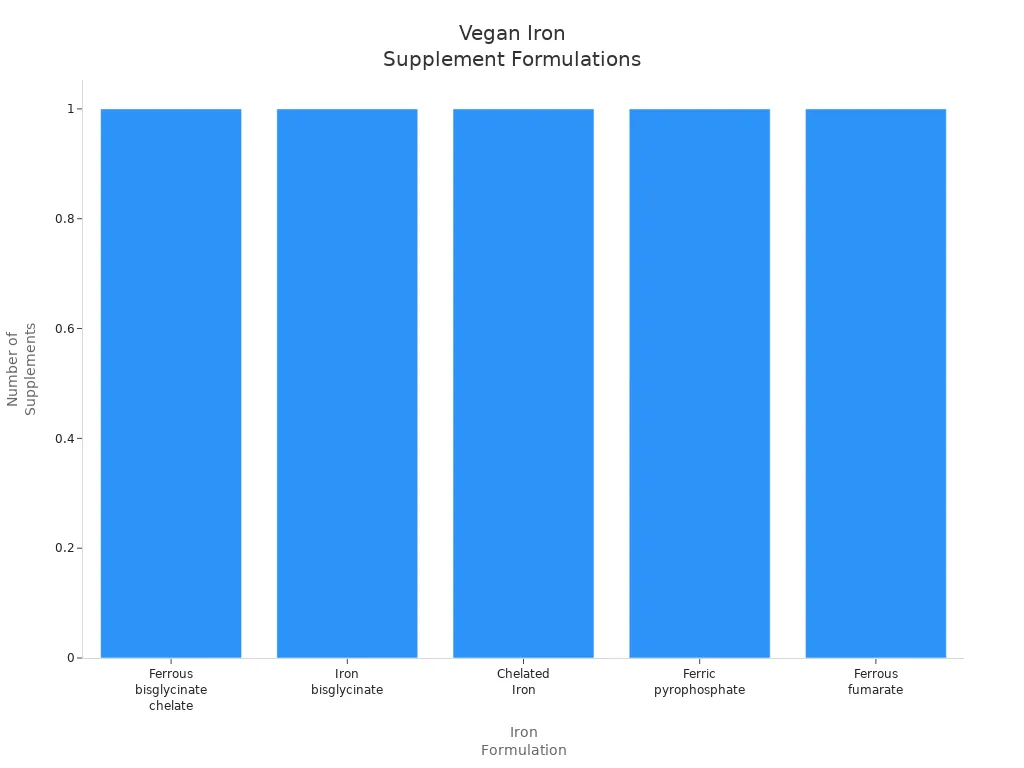
You can choose capsules, gummies, or chelated forms. Some supplements add vitamin C or B vitamins to help your body use iron better. Always check the label to make sure your supplement fits your needs.
Calcium for Vegans
Bone Health
You want strong bones, right? Calcium plays a big part in keeping your bones healthy, especially if you follow a vegan diet. Many people who eat only plants get less calcium than those who eat animal foods. Here’s why calcium matters for your bones:
- You need enough calcium to keep your bones strong.
- Getting the right amount of calcium helps lower your risk of fractures.
- Calcium works best when you also get enough vitamin D and protein.
If you care about your long-term health, make sure you pay attention to this important nutrient.
Intake
How much calcium do you need each day? The answer depends on your age and gender. Most adults should aim for 1,000 mg per day. If you are a woman over 51 or a man over 70, you need 1,200 mg daily. These numbers match what experts in the U.S. and around the world suggest. Keeping your intake at the right level helps you stay healthy and active.
- Adults (19-50 years) and men (51-70 years): 1,000 mg per day
- Women over 51 years: 1,200 mg per day
- Men over 70 years: 1,200 mg per day
Plant Sources
You can get calcium from many plant foods. Some of the best choices are fortified drinks, leafy greens, seeds, and tofu. Check out this table to see how much calcium you get from different foods:
| Food Source | Calcium Content (mg) |
|---|---|
| Fortified Almond Milk | 240 |
| Fortified Soya Milk | 240 |
| Fortified Oat Milk | 240 |
| Fortified Coconut Milk | 240 |
| Fortified Soya Yogurt | 150 |
| Fortified Coconut Yogurt | 150 |
| Spinach | 128 |
| Kale | 120 |
| Turnip Greens | 110 |
| Okra | 96 |
| Mustard Greens | 94 |
| Figs | 69 |
| Sesame Seeds | 201 |
| Chia Seeds | 189 |
| Tofu (calcium fortified) | 350 |
| Vegan Sausages | 136 |
| Tempeh | 120 |
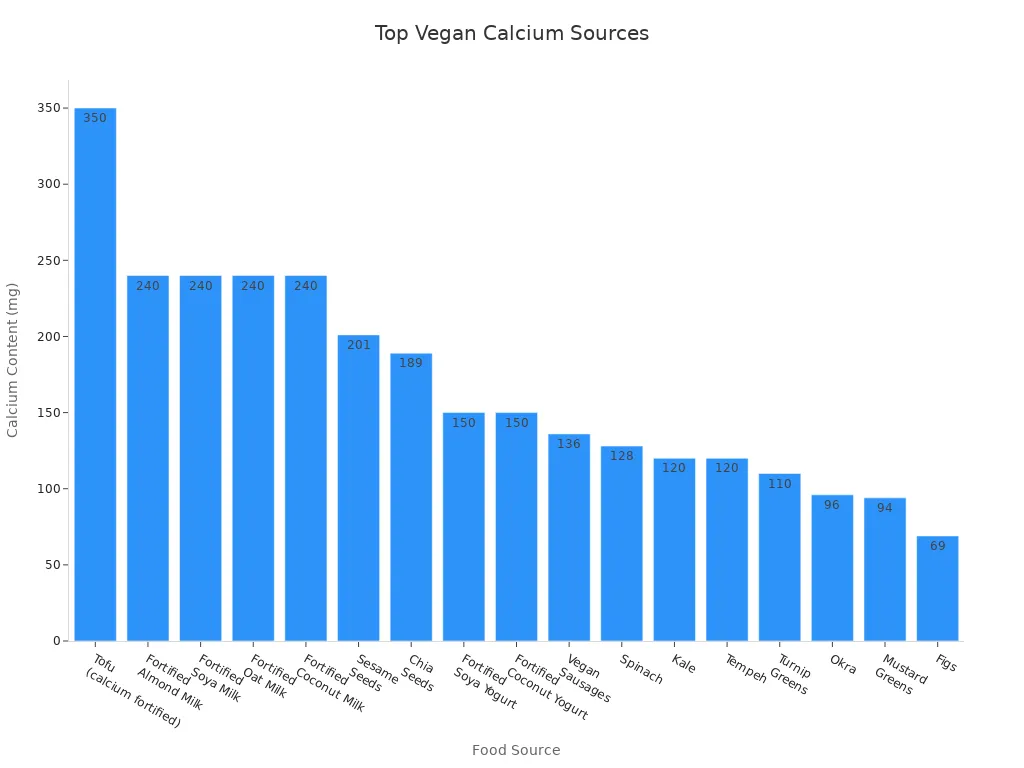
Tip: Try adding fortified plant milks or tofu to your meals. These foods make it easier to reach your daily calcium goal.
Supplement Choices
Sometimes, you need extra help from vegan supplements. If you struggle to get enough calcium from food, you can choose from several options. Here’s a quick look at some popular choices:
| Vegan calcium Supplement | Form of calcium | Affordability (cost/serving) | Accessibility | Dosing |
|---|---|---|---|---|
| Maplelife Nutrition – Pure Vegan Calcium | Calcium carbonate from red algae | $0.16 per tablet | Amazon Canada | 200 mg/tablet, 2-3 tablets/day |
| Webber Naturals Calcium Citrate | Calcium citrate | $0.10 per tablet | Amazon Canada | 300 mg/tablet, 2-5 tablets/day |
| Now Calcium Citrate | Calcium citrate | $8.79 per 227g powder | Amazon Canada and US | 600 mg/1.5 tsp |
You can pick the form that fits your routine. Supplementation helps you fill any gaps in your nutrition and keeps your bones strong.
Zinc, Iodine, Selenium
Importance
You need zinc, iodine, and selenium for your body to work well every day. These trace minerals help with many important jobs. Zinc keeps your immune system strong and helps wounds heal. Iodine controls your thyroid, which manages your energy and growth. Selenium protects your cells from damage and supports your metabolism. If you follow a vegan diet, you might not get enough of these nutrients because plant foods have lower amounts and your body cannot absorb them as easily. Phytate in plants makes it harder for you to use zinc. Many nutrition experts say you should watch your intake of these minerals, especially if you are young or still growing.
If you do not get enough iodine, you could face iodine deficiency. This can lead to problems with your thyroid and slow down your growth. Selenium deficiency can make you feel tired and weak. Zinc deficiency can cause skin problems and make you get sick more often.
Intake
You want to know how much zinc, iodine, and selenium you need each day. Here is a simple table to help you check your intake:
| Nutrient | Recommended Intake | Vegan Average Intake | Status |
|---|---|---|---|
| Iodine | 70 μg/day | 24.4 μg/day | Below |
| Selenium | 40 μg/day | 24.7 μg/day | Below |
| Zinc | 7 mg/day | 8.4 mg/day | Sufficient |
Most vegans get enough zinc, but many fall short on iodine and selenium. You should pay attention to your iodine intake to avoid iodine deficiency. Selenium is also important for your health, so make sure you get enough.
Vegan Sources
You can find zinc, iodine, and selenium in some plant foods. Here are some vegan sources for iodine:
| Vegan Iodine Source | Iodine Content | Percent DV |
|---|---|---|
| Iodized salt (1.5 g, ~1/4 tsp) | 71 mcg | 47% |
| Seaweed, whole or sheet, 1 g | 16 to 2,984 mcg | 11% to 1,989% |
| Enriched white bread, 2 pc | 45 mcg | 30% |
| Dried prunes (5 prunes) | 13 mcg | 9% |
| Lima beans (mature), boiled, 1/2 cup | 8 mcg | 5% |
| Banana (1 medium) | 3 mcg | 2% |
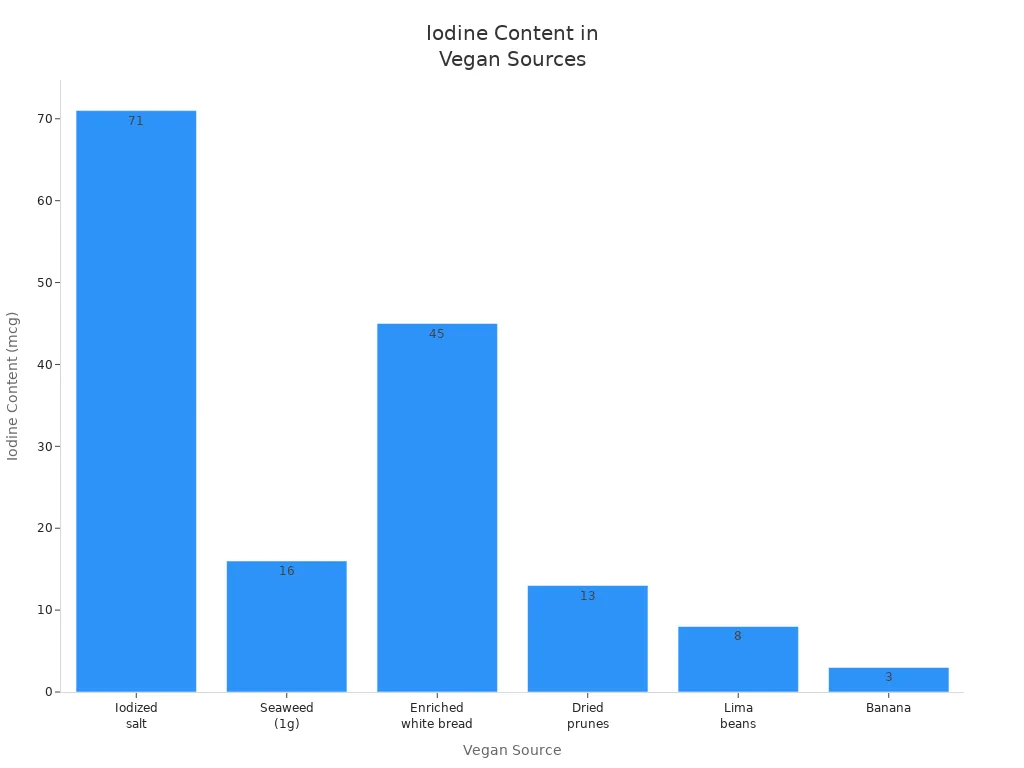
You can get iodine from iodized salt and seaweed. Seaweed has a lot of iodine, but you should not eat too much. For selenium, try Brazil nuts, sunflower seeds, and brown rice. Zinc comes from pumpkin seeds, lentils, and chickpeas. Always check your diet to see if you get enough of these nutrients.
Supplement Options
Sometimes, you need vegan supplements to fill the gaps in your nutrition. You can find small doses of supplemental iodine, selenium, and zinc in many products. One popular choice is VEG 1, which gives you vitamin B12, vitamin D, iodine, and selenium. You can also buy single supplements for each mineral. Supplementation helps you avoid iodine deficiency and keeps your selenium levels healthy. If you worry about your intake, talk to a doctor or dietitian before you start new supplements.
Tip: If you want to stay healthy on a vegan diet, check your nutrients and use vegan supplements when needed.
Vegan Multivitamins
Benefits
You might wonder if a vegan multivitamin can really help you stay healthy. Many people who follow a vegan diet use multivitamins to fill gaps in their nutrition. Clinical studies show that these supplements can make a difference, especially for vitamin B12. Take a look at this table to see what researchers found:
| Study | Findings |
|---|---|
| Wolters et al. (2005) | No significant change in MMA levels; benefit observed in those with poor B12 status. |
| Chen et al. (2022) | Significant increase in serum B12 levels in treatment group. |
| Frankenfeld (2020) | Observational study found benefit from multivitamin use for B12 status in older adults. |
You can see that vegan multivitamins help boost B12 levels, especially if your intake is low. If you want to support your energy, brain, and overall health, a multivitamin can be a smart choice. You get peace of mind knowing you cover important nutrients like B12, vitamin D, and iron. Some people feel more energetic and notice better focus after adding vegan supplements to their daily routine.
Tip: If you struggle to eat a wide variety of plant foods every day, a multivitamin can help you meet your nutrition goals.
Choosing Multivitamins
Picking the right vegan multivitamin can feel tricky. You want to make sure you get the best for your body and the planet. Here are some things to look for when you shop:
- Contains essential nutrients like vitamin B12, vitamin D, iron, calcium, choline, and iodine in natural forms.
- Prefer capsules over tablets for better absorption.
- Ensure optimum doses and forms of nutrients.
- Avoid additives, allergens, preservatives, palm oil, and plastic packaging.
- Packaging should be plastic-free, lightweight, and recyclable.
- Ingredients should be as natural as possible, such as preferring vitamin C from Acerola Cherry over synthetic options.
You can check the label for these features. If you care about the environment, choose vegan supplements with eco-friendly packaging. You also want to avoid anything that could upset your stomach or cause allergies. When you pick a multivitamin with the right nutrients, you help your body stay strong and healthy on a vegan diet.
Choosing Food Supplements
Factors
You want to pick the best supplements for your health. Start by thinking about your own needs. Your age, lifestyle, and diet all matter. Some people need more vitamin D or iron. Others might need extra calcium or zinc. Check your daily intake and see where you might fall short. If you eat a variety of foods, you may need fewer supplements. If you skip certain foods, you might need more help.
Here are some things to consider:
- Your age and gender
- Your activity level
- Any health conditions you have
- What you eat every day
Tip: Write down what you eat for a week. This helps you spot any gaps in your nutrition.
Labels
Reading supplement labels can feel tricky, but you can do it. Look for clear signs that a product is vegan. Some labels say “vegan,” but others use special logos. These logos show that the supplements are free from animal products and testing. You also want to check for hidden animal ingredients. Some supplements use gelatin or dairy, so always read the ingredient list.
Here’s a table to help you spot trusted certifications:
| Certification Name | Description |
|---|---|
| Vegan Society Trademark | A globally recognized symbol certifying products are free from animal derivatives in ingredients and production. |
| Certified Vegan Logo | A U.S.-based standard confirming the absence of animal products, by-products, and testing. |
When you shop, keep these tips in mind:
- Look for certified vegan logos for transparency.
- Understand the difference between “vegan” and “plant-based.”
- Be aware of hidden animal-derived ingredients.
- Check for cruelty-free designations.
- Scrutinize ingredient lists for transparency.
Professional Advice
You might feel unsure about which supplements to choose. Talking to a healthcare professional can help. A doctor or dietitian knows how to check your intake and spot any problems. They can suggest the right supplements for you. If you have health issues or take medicine, always ask before starting new supplements. This keeps you safe and helps you get the most benefit.
Note: Your needs are unique. Professional advice makes sure you get the right support for your vegan lifestyle.
You now know which food supplements matter most for vegans. Vitamin B12, vitamin D, iron, calcium, iodine, zinc, selenium, and omega-3 help you stay healthy. Your needs might change, so keep track of your nutrition and check your levels often.
Always talk with your doctor before you start new supplements.
Stay curious about vegan nutrition. When you learn more, you make better choices for your health.
FAQ
What happens if you skip vitamin B12 as a vegan?
You might feel tired or weak. Over time, you could get nerve problems or anemia. Your body needs B12 for healthy blood and nerves.
Tip: Always check your B12 intake and use a supplement if needed.
Can you get enough omega-3 from plants?
You can get some omega-3 from chia seeds, flaxseeds, and walnuts. Your body may not use it as well as fish-based omega-3. Many vegans choose algae-based supplements for better results.
Do you need to take all these supplements every day?
Not always! Some supplements, like B12, can be taken weekly in higher doses. Others, like vitamin D or iron, depend on your diet and health.
- Check your needs
- Talk to a doctor
Are vegan supplements safe for kids?
Most vegan supplements are safe for kids, but you should pick the right dose for their age. Always read the label.
Note: Ask your child’s doctor before starting any new supplement.

Poseidon
Master of Nutritional Epidemiology, University of Copenhagen, Herbal Functional Nutrition Researcher
Focus: The scientific application of natural active ingredients such as Tongo Ali, Horny Goat Weed, and Maca to sexual health and metabolic regulation.
Core Focus:
Men: Use a combination of Tongo Ali (an energizing factor) + Maca (an energy reserve) to improve low energy and fluctuating libido.
Women: Use a combination of Horny Goat Weed (a gentle regulator) + Maca (a nutritional synergist) to alleviate low libido and hormonal imbalances.
Stressed/Middle-Aged Adults: This triple-ingredient synergy supports metabolism, physical strength, and intimacy.
Product Concept:
Based on traditional applications and modern research (e.g., Tongo Ali promotes testosterone-enhancing enzyme activity, and icariin provides gentle regulation), we preserve core active ingredients and eschew conceptual packaging—using natural ingredients to address specific needs.
Simply put: I'm a nutritionist who understands "herbal actives." I use scientifically proven ingredients like Tongo Ali, Epimedium, and Maca to help you make "sexual health" and "nutritional support" a daily routine.
